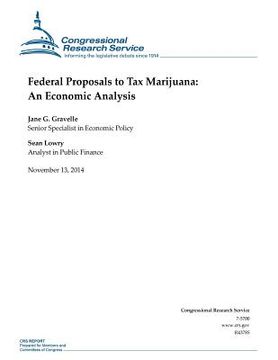Synopsis "Federal Proposals to Tax Marijuana: An Economic Analysis (in English)"
The combination of state policy and general public opinion favoring the legalizing of marijuana has led some in Congress to advocate for legalization and taxation of marijuana at the federal level. The Marijuana Tax Equity Act of 2013 (H.R. 501) would impose a federal excise tax of 50% on the producer and importer price of marijuana. The National Commission on Federal Marijuana Policy Act of 2013 (H.R. 1635) proposes establishing a National Commission on Federal Marijuana Policy that would review the potential revenue generated by taxing marijuana, among other things. This report focuses solely on issues surrounding a potential federal marijuana tax. First, it provides a brief overview of marijuana production. Second, it presents possible justifications for taxes and, in some cases, estimates the level of tax suggested by that rationale. Third, it analyzes possible marijuana tax designs. The report also discusses various tax administration and enforcement issues, such as labeling and tracking. Economic theory suggests the efficient level of taxation is equal to marijuana's external cost to society. Studies conducted in the United Kingdom (UK) and Canada suggest that the costs of individual marijuana consumption to society are between 12% and 28% of the costs of an individual alcohol user, and total social costs are even lower after accounting for the smaller number of marijuana users in society. Based on an economic estimate of $30 billion of net external costs for alcohol, the result is an external cost of $0.5 billion to $1.6 billion annually for marijuana. These calculations imply that an upper limit to the economically efficient tax rate could be $0.30 per marijuana cigarette (containing an average of one half of a gram of marijuana) or $16.80 per ounce. An increased number of users in a legal market would raise total costs, but not necessarily costs per unit. Some could also view excise taxes as a means to curtail demand, particularly as the price of marijuana can be expected to drop from current retail prices of up $200-$300 per ounce to prices closer to the cost of production at $5-$18 per ounce, if broadly legalized. The demand for marijuana is estimated to be relatively price inelastic, meaning that consumer demand is relatively insensitive to price changes. Although previous studies of marijuana demand largely examine consumers willing to engage in illegal activities, it appears that higher tax rates would have a minor effect on reducing demand. With this said, tax policy, coupled with adequate law enforcement, could be an effective tool to limit marijuana consumption among youth, as empirical studies indicate that their demand is more sensitive to price than non-youth. Excise taxes on marijuana could also be levied primarily to raise revenue, as has been historically the case with tobacco and alcohol. As an illustration, assuming a total market size of $40 billion, a federal tax of $50 per ounce is estimated to raise about $6.8 billion annually, after accounting for behavioral effects associated with price decreases following legalization. The choices in administrative design could affect consumer behavior, production methods, evasion rates, or the tax base of a federal marijuana excise tax. Some of the more significant choices include whether to exempt medicinal uses or homegrown marijuana from tax.

